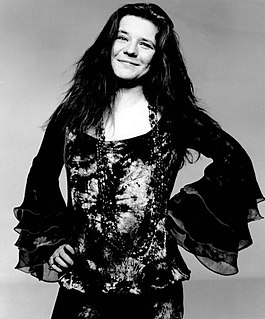
Janis Joplin was an American singer-songwriter who sang rock, soul, and blues music. One of the most successful and widely known rock stars of her era, she was noted for her powerful mezzo-soprano vocals and "electric" stage presence.
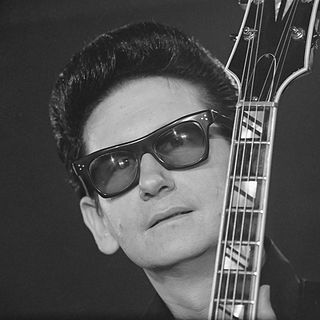
Roy Kelton Orbison was an American singer, songwriter, and musician known for his impassioned singing style, complex song structures, and dark, emotional ballads. His music was described by critics as operatic, earning him the nicknames "The Caruso of Rock" and "The Big O." Many of Orbison's songs conveyed vulnerability at a time when most male rock-and-roll performers chose to project masculinity. He performed while standing motionless and wearing black clothes to match his dyed black hair and dark sunglasses, which he wore to counter his shyness and stage fright.

Stephen Ray Vaughan was an American musician, singer, songwriter, and record producer, best known as the guitarist and frontman of the blues rock trio Stevie Ray Vaughan and Double Trouble. Although his mainstream career only spanned seven years, he is regarded as one of the most influential musicians in the history of blues music, and one of the greatest guitarists of all time.
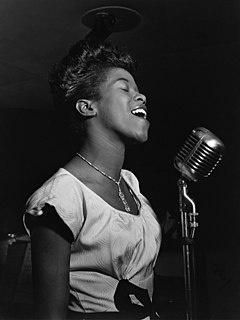
Sarah Lois Vaughan was an American jazz singer.

"Me and Bobby McGee" is a song written by American singer-songwriter Kris Kristofferson and originally performed by Roger Miller. Fred Foster shares the writing credit, as Kris Kristofferson intended. A posthumously released version by Janis Joplin topped the U.S. singles chart in 1971, making the song the second posthumously released No. 1 single in U.S. chart history after "(Sittin' On) The Dock of the Bay" by Otis Redding. Jerry Lee Lewis also released a version reaching number 1 on the country charts in 1971. Billboard ranked Joplin's version as the No. 11 song for 1971.
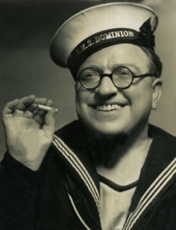
Albert Arthur Powell MBE, known as Sandy Powell, was an English comedian best known for his radio work of the 1930s and for his catchphrase "Can you hear me, mother?". He first said this in a theatre in Coventry. Fifty years later, deciding he needed a rest from the business, he again said it in a Coventry theatre, for the last time.
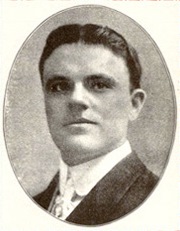
William Thomas Murray was one of the most popular singers in the United States in the early 20th century. While he received star billing in vaudeville, he was best known for his prolific work in the recording studio, making records for almost every record label of the era.
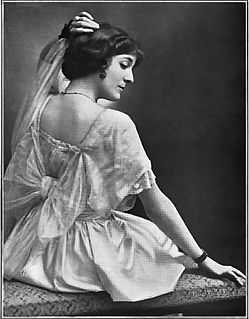
Elsie Janis was an American actress of stage and screen, singer, songwriter, screenwriter and radio announcer. Entertaining the troops during World War I immortalized her as "the sweetheart of the AEF".
"Little Wing" is a song written by Jimi Hendrix and recorded by the Jimi Hendrix Experience in 1967. It is a slower tempo, rhythm and blues-inspired ballad featuring Hendrix's vocal and guitar with recording studio effects accompanied by bass, drums, and glockenspiel. Lyrically, it is one of several of his songs that reference an idealized feminine or guardian angel-like figure. At about two and a half minutes in length, it is one of his most concise and melodically focused pieces.

Frankie Vaughan was an English singer and actor who recorded more than 80 easy listening and traditional pop singles in his lifetime. He was known as "Mr. Moonlight" after his signature song "Give Me the Moonlight, Give Me the Girl". Two of Vaughan's singles topped the UK Singles Chart - "The Garden of Eden" (1957) and "Tower of Strength" (1961). He starred in several films, including a role opposite Marilyn Monroe in Let's Make Love (1960).

Let's Dance is the 15th studio album by English singer-songwriter David Bowie, released on 14 April 1983 through EMI America Records. After the release of Scary Monsters (1980), Bowie began a period of numerous musical collaborations and film appearances. During this time, he also left RCA Records due to dissatisfaction. After signing with EMI America in late 1982, Bowie decided he wanted a fresh start, and chose Nile Rodgers of the rock/disco band Chic to co-produce his next record.

Alan Earle O'Day was an American singer-songwriter, best known for writing and singing "Undercover Angel," a million-selling Gold-certified American No. 1 hit in 1977. He also wrote songs for many other notable performers, such as 1974's Helen Reddy No. 1 hit "Angie Baby" and the Righteous Brothers' No. 3 Gold hit "Rock and Roll Heaven". In the 1980s he moved from pop music to television, co-writing nearly 100 songs for the Saturday morning Muppet Babies series, and in the 1990s he wrote and performed music on the National Geographic series Really Wild Animals. O'Day also collaborated with Tatsuro Yamashita on a series of popular songs in Japan including "Your Eyes", "Magic Ways", "Christmas Eve" and "Fragile".

Roy Orbison was an American singer-songwriter who found the most success in the early rock and roll era from 1956 to 1964. He later enjoyed a resurgence in the late 1980s with chart success as a member of the Traveling Wilburys and with his Mystery Girl album which included the hit single "You Got It". At the height of his popularity, 22 of Orbison's songs placed on the US Billboard Top 40 chart, and six peaked in the top five, including two number one hits. In the UK, Orbison scored ten top-10 hits between 1960 and 1966, including three No. 1 singles.

"The Raggle Taggle Gypsy", is a traditional folk song that originated as a Scottish border ballad, and has been popular throughout Britain, Ireland and North America. It concerns a rich lady who runs off to join the gypsies. Common alternative names are "Gypsy Davy", "The Raggle Taggle Gypsies O", "The Gypsy Laddie(s)", "Black Jack David" and "Seven Yellow Gypsies".
"Hesitation Blues" is a popular song adapted from a traditional tune. One version was published by Billy Smythe, Scott Middleton, and Art Gillham. Another was published by W.C. Handy as "Hesitating Blues". Because the tune is traditional, many artists have taken credit as writer, frequently adapting the lyrics of one of the two published versions. Adaptations of the lyrics vary widely, though typically the refrain is recognizably consistent. The song is a jug band standard and is also played as blues and sometimes as Western swing. It is cataloged as Roud Folk Song Index No. 11765. Composer William Grant Still arranged a version of the song in 1916 while working with Handy.
"Moonlight in Vermont" is a popular song about the U.S. state of Vermont, written by John Blackburn (lyrics) and Karl Suessdorf (music) and published in 1944. It was introduced by Margaret Whiting in a 1944 recording.

Janis Darlene Martin was an American rockabilly and country music singer. She was one of the few women working in the male-dominated rock and roll music field during the 1950s and one of country music's early female innovators. Martin was nicknamed the Female Elvis for her dance moves on stage, similar to those of Elvis Presley.
"Mean to Me" is a popular song with music by Fred E. Ahlert and lyrics by Roy Turk, published in 1929. Hit versions that year were by Ruth Etting and by Helen Morgan. Ben Bernie and the Hotel Roosevelt Orchestra also recorded what might be the first male version in February 1929 with vocals by Scrappy Albert.

Stevie Ray Vaughan was an American blues rock guitarist, singer, and songwriter, and the frontman for the band Double Trouble. During his career he released four studio albums, one live album, and several singles.

Mean Girls is a coming-of-age stage musical with music by Jeff Richmond, lyrics by Nell Benjamin, and a book by Tina Fey. It is based on the 2004 film of the same name also written by Fey. The musical premiered at the National Theatre, Washington, D.C., in October 2017 and opened on Broadway in April 2018 at the August Wilson Theatre. Due to the COVID-19 pandemic, the show played its final performance on Broadway on March 11, 2020.















